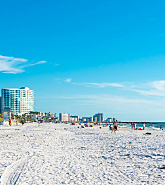This winter storm season has seen the most severe sequence of storms since 1990.
Another windstorm to affect the U.K., Windstorm Christina, brought heavy rain, strong winds, and large waves to coastal regions of the U.K. causing further flooding on Monday, January 7. More than 300 properties have flooded to date as a result of Windstorm Christina in England and Wales. The worst affected areas appear to be the coastlines of South England and Wales.
In England, sea defenses were breached at Chesil Beach in Portland, Dorset, as a result of high waves, causing evacuations. Flooding has also affected properties in parts of the Somerset Levels, leaving some villages cut off, with roads and buildings damaged. In Salisbury, Wiltshire, residents were also asked to leave their homes.
Since the peak of the 2013/2014 winter storm season started in December, Northern Europe has been bombarded by 17 low-pressure systems. These weather systems have swept in off the North Atlantic and brought strong wind gusts in excess of 90 mph in remote locations and gusts over 70 mph over large parts of the U.K.
Extreme rainfall levels have been observed across the country, particularly in Scotland where one location observed 73.6 mm of rain on Christmas Eve. The significant precipitation contributed to December seeing 154% of the U.K. historical average rainfall for that month and in Scotland it was the wettest December since records began in 1910.
This extreme rainfall has left the ground saturated, with groundwater levels in some regions much higher than usual for this time of year, heightening the risk of flooding should the persistent rainfall continue.
At the start of December 2013, windstorm Xaver raced across northern Europe bringing strong winds and coastal flooding to the east of the U.K., northern Germany and the Netherlands. Flood damage was mitigated by improved coastal defenses, which had been upgraded following the devastating 1953 (U.K. & Netherlands) and 1962 (Hamburg, Germany) floods.
Over the Christmas and New Year period, storms Dirk, Erich and Felix brought more strong winds and precipitation, particularly to the U.K., Ireland and northern France. While the winds from these storms caused only moderate damage and disruption to power and transport networks, persistent precipitation was and remains a significant concern for flooding.
The succession of large and intense low pressure weather systems has been a function of a very strong and stable jet stream, fed by the strong contrast between the warm tropical Atlantic air masses and intensely cold Arctic air over North America.
Although this sequence cannot be directly linked with climate change – the coastal flooding will be more common in the future, while winter rainfall totals are expected to rise.
A number of towns along the west coast of England and Wales are relatively unprotected from sea flooding, and consideration will now need to be given to how they can be defended. As sea level rises it will become increasingly and prohibitively expensive to protect all these communities.






